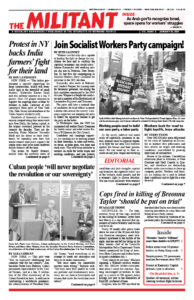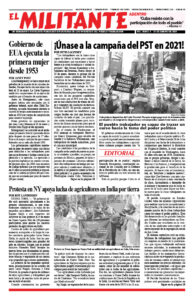Over the last six months the seven-decades-long boycott of the Jewish state of Israel initiated by Arab governments in the Middle East has begun to break apart. This is good for working people in Israel and the Palestinian territories, throughout the Middle East and beyond.
In a series of steps brokered by President Donald Trump’s administration, the governments of the United Arab Emirates, Bahrain, Sudan and most recently Morocco on Dec. 10 established diplomatic relations with Israel. They won’t be the last. This is the most important legacy of the Trump administration’s foreign policy.
President-elect Joe Biden told the press he will “build on” it. While saying they don’t expect the Biden administration to pursue this course with “the same zeal,” the Jerusalem Post said Dec. 13 that it will be “unlikely to put up obstacles.”
The boycott — which has been unraveling for years — was imposed on the pretext of defending the national rights of the Palestinian people, but in reality it undermined that struggle.
The Saudi government is pressing regimes it influences to recognize Israel. Israeli Prime Minister Benjamin Netanyahu met with Saudi Prince Mohammed bin Salman in Saudi Arabia Nov. 22. It was the first time there was ever such a meeting. That month Pakistani Prime Minister Imran Khan said his government was under pressure from Washington to join in recognizing Israel.
This opens the door wider to the possibility of talks between the government of Israel and Palestinian organizations aimed at establishing a Palestinian state and recognition of Israel. As part of the deal with the UAE, the Israeli government agreed to freeze any moves toward annexing parts of the Palestinian West Bank.
Israel was founded in 1948 in the wake of World War II and the murder of 6 million Jews by the imperialist Nazi regime in Germany. Turned away by governments in the U.S. and Europe, many Jewish refugees fled to Palestine. This led to the establishment of the state of Israel, which has existed for 73 years.
To win the government of Sudan to recognize Israel, the White House removed Khartoum from the U.S. list of “terrorist” nations.
At the urging of the White House, the governments of Saudi Arabia, the UAE, Bahrain and Egypt Jan. 5 lifted their embargo on Qatar, imposed in 2017 to punish the Qatari government for its relations with the Iranian and Turkish governments.
The regime in Qatar, home to the largest U.S. military base in the region, tries to balance between the Sunni-based capitalist regimes of the Gulf States and their rival in the Shiite-based regime in Tehran. The Israeli government has worked with the Qatar rulers, encouraging them to send funds to Hamas in the Gaza Strip — over $1 billion since 2012. Its goal was to avoid a social explosion there while putting pressure on Hamas to restrain terrorist attacks.
Open road for working-class struggles
None of these capitalist regimes, including Israel, represent working people. These rulers see establishing relations as a way to block the regime in Iran — which through military intervention in Syria, Lebanon, Iraq and beyond threatens their interests — and to advance their own economic progress. But the result of the pacts between Jerusalem and the growing number of Arab regimes have opened doors for working people.
Already thousands of Israeli tourists have visited Abu Dhabi, in the UAE. “You can walk around freely there, even with a kippa,” Israeli tour guide Muhammed Suliman, who takes Jewish visitors to Dubai, told Haaretz.
Since the pact was signed the government of the UAE has facilitated family reunifications for Jewish Yemenis who have not seen relatives in decades.
According to Haaretz, there is talk of UAE financing an oil pipeline and a canal from Eliat — on Israel’s southern Red Sea coast — to Israel’s Mediterranean sea ports.
Most importantly, as these developments unfold there will be renewed openings for working people to press for immediate talks to recognize both Israel and a contiguous, sovereign Palestinian state, including East Jerusalem. And for recognition of the rights of Jews everywhere to take refuge in Israel in the face of the global rise of anti-Semitic violence.
Along this road working people of all religions and beliefs in Israel and Palestine can use political space to organize and fight, to work together and deepen struggles against their common class enemy — the exploiting capitalist rulers.

